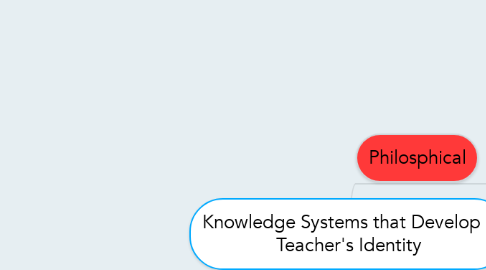
1. Historical
1.1. Changing teaching methods
1.1.1. Teaching over the past decade has change tremendously with the advancement of technology.
1.1.1.1. Classrooms and schools now involve some form of computers or the use of the internet and social media.
1.1.1.1.1. Websites provide and excellent source of learning and research material.
1.1.1.1.2. Cyber Bullying has become a problem in the past 5 years with the growth of social media.
1.1.1.1.3. Students can easily be distracted by all the "cool" technology and have problems focusing on "boring" work.
1.2. Aboriginal groups and their history
1.2.1. The First Nations are a large part of Canada's history. Teaching their history is important to keep Canadian culture unique.
1.2.1.1. Racism has always been a problem. Providing a tolerant environment is necessary to stop the cycle of racism.
2. Philosphical
2.1. Connecting to students on a deeper level of consciousness
2.1.1. Connecting with a students phycology with philosophy allows for better understanding of a student's situation.
2.1.1.1. Divergent Thinking allows students to explore to find more than just one "right" answer.
2.2. Multiple philosophies when teaching different subjects.
2.2.1. Math or Science: a more essentialist focus. Little to no discussion.
2.2.2. English: a focus on critical thinking, and understanding of subtleties and themes.
2.2.3. Social Studies: focusing on progression by connecting cause and effects of action throughout history and current events.
3. Sociological
3.1. Teaching children for a changing and uncertain future.
3.1.1. Educational reform all around the world is attempting to structure public school system for the future that no one has any idea what it will look like. Structured around a system developed in late 1800's/early 1900's.
3.1.1.1. Divergent thinking or "lateral thinking", is present in all people at a young age and deteriorates after standard education. Divergent thinking works best in collaboration, and represents a real world experience of problem solving but is not taught in schools.
3.1.1.2. The current model of public education is modeled and embodied after and industrial age or factory. Providing a new and understanding way of teaching old curriculum is a step in the right direction.
3.2. Education reflects society.
3.2.1. Largest rate of secondary education graduates and university enrollments in history.
3.2.1.1. The parents of the current generation were guaranteed jobs if they had a degree; no longer the case.
3.2.1.1.1. In Alberta it is a lot easier to make large amounts of money without a degree or even a high school diploma.
3.2.1.1.2. A possible shift to the labor sector with the depleting work force.
3.3. Understanding and respecting diverse social and religious groups.
3.3.1. Knowing sensitive topics and how to discuss them properly.
3.3.2. Providing an understanding and accepting environment where students who are experiencing a budding sexuality.
